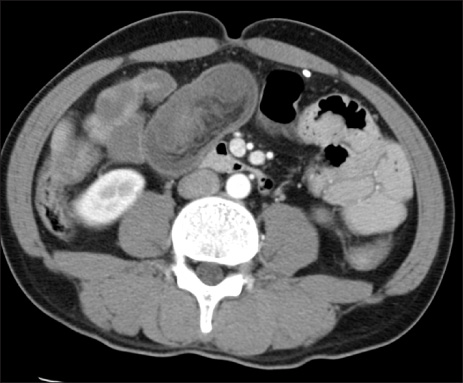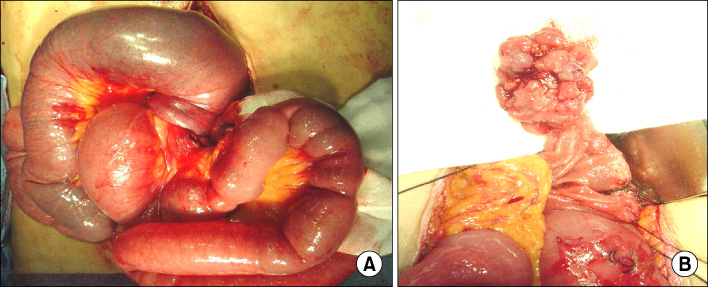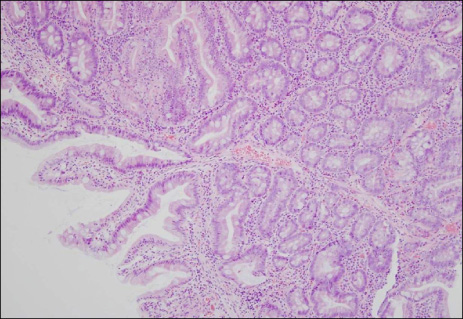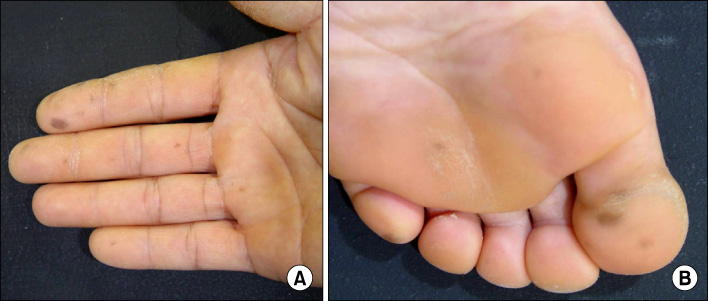J Korean Surg Soc.
2009 Nov;77(5):353-356. 10.4174/jkss.2009.77.5.353.
Peutz-Jeghers Syndrome with Intussusception
- Affiliations
-
- 1Department of Surgery, Gyeongsang National University School of Medicine, Jinju, Korea. jshgnuh@naver.com
- KMID: 1750705
- DOI: http://doi.org/10.4174/jkss.2009.77.5.353
Abstract
- Peutz-Jeghers syndrome (PJS) is a rare disease of autosomal dominant inheritance, which is characterized by multiple hamartomatous polyps and mucocutaneous pigmentations. Multiple hamartomatous polyps in the gastrointestinal tract are the hallmarks of PJS, and occur most commonly in the small intestine. Complications induced by polyps include colicky abdominal pain, bleeding, bowel obstruction; rectal prolapse of polyps, and intussusceptions. A male patient visited our emergency room with colicky abdominal pain. The patient was diagnosed small intestine intussusceptions with multiple polyps. We report this case with a review of the literature.
Keyword
MeSH Terms
Figure
Cited by 1 articles
-
Polyp Clearance via Operative and Endoscopic Polypectomy in Patients With Peutz-Jeghers Syndrome After Multiple Small Bowel Resections
Do Hyun Lee, Hyun Deok Shin, Woo Hee Cho, Kyoung Hwang Shin, Sora Lee, Jeong Eun Shin, Hwan Namgung, Ji Eun Gwon
Intest Res. 2014;12(4):320-327. doi: 10.5217/ir.2014.12.4.320.
Reference
-
1. Bruwer A, Bargen JA, Kierland RR. Surface pigmentation and generalized intestinal polyposis; (Peutz-Jeghers syndrome). Proc Staff Meet Mayo Clin. 1954. 29:168–171.2. Jenne DE, Reimann H, Nezu J, Friedel W, Loff S, Jeschke R, et al. Peutz-Jeghers syndrome is caused by mutations in a novel serine threonine kinase. Nat Genet. 1998. 18:38–43.3. Giardiello FM, Welsh SB, Hamilton SR, Offerhaus GJ, Gittelsohn AM, Booker SV, et al. Increased risk of cancer in the Peutz-Jeghers syndrome. N Engl J Med. 1987. 316:1511–1514.4. Giardiello FM, Brensinger JD, Tersmette AC, Goodman SN, Petersen GM, Booker SV, et al. Very high risk of cancer in familial Peutz-Jeghers syndrome. Gastroenterology. 2000. 119:1447–1453.5. Giardiello FM, Trimbath JD. Peutz-Jeghers syndrome and management recommendations. Clin Gastroenterol Hepatol. 2006. 4:408–415.6. De Leng WW, Westerman AM, Weterman MA, De Rooij FW, Dekken Hv H, De Goeij AF, et al. Cyclooxygenase 2 expression and molecular alterations in Peutz-Jeghers hamartomas and carcinomas. Clin Cancer Res. 2003. 9:3065–3072.7. Edwards DP, Khosraviani K, Stafferton R, Phillips RK. Long-term results of polyp clearance by intraoperative enteroscopy in the Peutz-Jeghers syndrome. Dis Colon Rectum. 2003. 46:48–50.
- Full Text Links
- Actions
-
Cited
- CITED
-
- Close
- Share
- Similar articles
-
- Peutz-Jeghers Syndrome with Recurrent Intussusception
- A Case of Peutz-Jeghers Syndrome with Intussusception
- Peutz-Jeghers syndrome: a new understanding
- Two Case Reports of Intussusception in Patients with Peutz-Jeghers Syndrome
- A case of Peutz-Jeghers syndrome associated with jejuno-ideal intussusception





